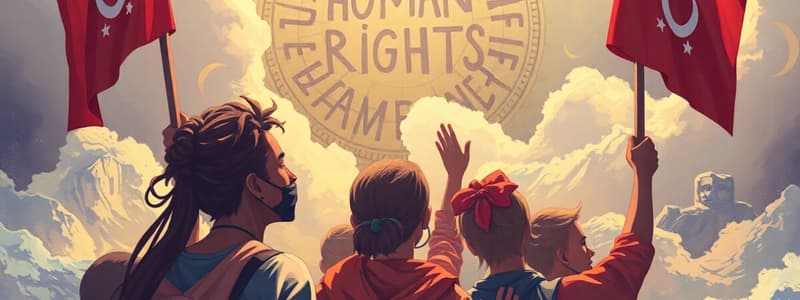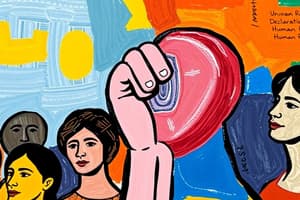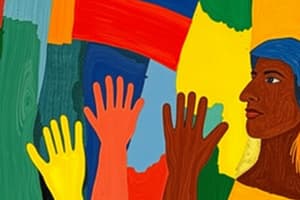Podcast
Questions and Answers
Match the following articles from the UDHR with their rights regarding legal recognition:
Match the following articles from the UDHR with their rights regarding legal recognition:
Article 6 = Right to recognition everywhere as a person before the law. Article 8 = Right to an effective remedy by competent national tribunals for acts violating fundamental rights. Article 10 = Right to a fair and public hearing by an independent and impartial tribunal. Article 11 = Right to be presumed innocent until proven guilty according to law in a public trial.
Match these UDHR articles with the freedoms they protect:
Match these UDHR articles with the freedoms they protect:
Article 18 = Freedom of thought, conscience, and religion. Article 19 = Freedom of opinion and expression. Article 20 = Freedom of peaceful assembly and association. Article 12 = Protection of privacy, family, home, or correspondence.
Match UDHR articles with the corresponding rights related to economic and social well-being:
Match UDHR articles with the corresponding rights related to economic and social well-being:
Article 23 = Right to work, to free choice of employment and protection against unemployment. Article 24 = Right to rest and leisure, including reasonable limitation of working hours and periodic holidays with pay. Article 25 = Right to a standard of living adequate for health and well-being. Article 26 = Right to education.
Match the Articles from the UDHR with their descriptions of fundamental human rights:
Match the Articles from the UDHR with their descriptions of fundamental human rights:
Match the UDHR articles with their descriptions regarding the right to movement and nationality:
Match the UDHR articles with their descriptions regarding the right to movement and nationality:
Match the following Articles with their description:
Match the following Articles with their description:
Match the articles from the UDHR with the corresponding right for creators and society:
Match the articles from the UDHR with the corresponding right for creators and society:
Link each freedom with its description.
Link each freedom with its description.
Match the Article of the Bill of Rights with its provision:
Match the Article of the Bill of Rights with its provision:
Match the following rights to the corresponding characteristic as defined by the UDHR:
Match the following rights to the corresponding characteristic as defined by the UDHR:
Match the technological advancements with potential effects on the 'right to privacy' as outlined by the UDHR:
Match the technological advancements with potential effects on the 'right to privacy' as outlined by the UDHR:
Match the following ways technology can impact human dignity as outlined by the UDHR:
Match the following ways technology can impact human dignity as outlined by the UDHR:
Match the following descriptions of fundamental human rights with their description:
Match the following descriptions of fundamental human rights with their description:
Match the following types of discrimination with what groups it affects:
Match the following types of discrimination with what groups it affects:
Match the correct description for the following aspects of the UDHR:
Match the correct description for the following aspects of the UDHR:
Match each human right with a tech policy to protect it:
Match each human right with a tech policy to protect it:
Match the following technological developments with a potential impact on Freedom as outlined by the UDHR:
Match the following technological developments with a potential impact on Freedom as outlined by the UDHR:
Match the concepts associated with human dignity with the ways technology can challenge it:
Match the concepts associated with human dignity with the ways technology can challenge it:
Match the policy strategies with their goals to prevent these violations:
Match the policy strategies with their goals to prevent these violations:
Match the following technological scenarios with their effects on safety:
Match the following technological scenarios with their effects on safety:
Match the following tech-affected scenarios that may lead to marginalisation:
Match the following tech-affected scenarios that may lead to marginalisation:
Match the solutions for mitigating the challenges with the violations:
Match the solutions for mitigating the challenges with the violations:
Match the following solutions for technological use and human augmentation with the solution to the violation:
Match the following solutions for technological use and human augmentation with the solution to the violation:
Flashcards
The good life
The good life
Living in a just and progressive society where citizens have the freedom to flourish.
Human Person
Human Person
The autonomy to make choices which may enable the flourishing of his/herself and society.
Human Dignity
Human Dignity
An ultimate core value of our existence; everyone has absolute moral worth by virtue of being human.
Article 1 of UDHR
Article 1 of UDHR
Signup and view all the flashcards
Article 2 of UDHR
Article 2 of UDHR
Signup and view all the flashcards
Article 3 of UDHR
Article 3 of UDHR
Signup and view all the flashcards
Article 4 of UDHR
Article 4 of UDHR
Signup and view all the flashcards
Article 5 of UDHR
Article 5 of UDHR
Signup and view all the flashcards
Article 6 of UDHR
Article 6 of UDHR
Signup and view all the flashcards
Article 7 of UDHR
Article 7 of UDHR
Signup and view all the flashcards
Article 10 of UDHR
Article 10 of UDHR
Signup and view all the flashcards
Article 13 of UDHR
Article 13 of UDHR
Signup and view all the flashcards
Article 18 of UDHR
Article 18 of UDHR
Signup and view all the flashcards
Freedom to assemble
Freedom to assemble
Signup and view all the flashcards
Article 23 of UDHR
Article 23 of UDHR
Signup and view all the flashcards
Article 27 of UDHR
Article 27 of UDHR
Signup and view all the flashcards
Article 29 of UDHR
Article 29 of UDHR
Signup and view all the flashcards
Philippine Constitution, Article II, Section 11
Philippine Constitution, Article II, Section 11
Signup and view all the flashcards
Article III, Section 1 of Philippine Constitution
Article III, Section 1 of Philippine Constitution
Signup and view all the flashcards
Article III, Section 2 of Philippine Constitution
Article III, Section 2 of Philippine Constitution
Signup and view all the flashcards
Study Notes
Introduction
- Evaluating contemporary human experience is necessary to strengthen the human person's role in society.
- Discussing the importance of human rights in changing social conditions and technological advancement is crucial.
- Identifying laws or policies that protect a person's well-being in technological advancement and ethical dilemmas is important.
Universal Declaration of Human Rights (UDHR)
- Living in a just and progressive society where citizens can flourish defines the good life.
- Individuals should have the autonomy to make choices that facilitate personal and societal growth.
- The UN General Assembly proclaimed the UDHR on December 10, 1948.
- The UDHR serves as a global standard for fundamental human rights, advocating for universal recognition and protection.
- The UDHR begins with the recognition of inherent dignity and equal, inalienable rights for all members of the human family as the foundation of freedom, justice, and peace.
- Everyone inherently possesses absolute moral worth by virtue of being human.
- Humandignity is an integral core value of people's existence.
- Recognizing and appreciating this truth in everyone helps create a just and progressive society.
- Through human dignity, society becomes more free, rational, and loving society.
- Empowerment leads to greater freedom in making life choices.
- Valuing and applying logic and science in life promotes rationality.
- Prioritizing human dignity ensures a more loving approach in all endeavors, whether scientific or not.
- Protecting fundamental human rights is vital in the face of changing conditions.
UDHR Details
- The UDHR is comprised of 30 articles outlining fundamental human rights.
- It establishes inalienable human rights essential for pursuing a fulfilling life, guaranteeing freedoms for everyone by virtue of being human.
- The first article emphasizes the principle of being human in a just, free, and rational society, stating all people are born free and equal in dignity and rights.
- Experientially, the inherent equality may not always be evident.
- Individuals with more to offer are often given preferential treatment.
- A just life demands equal treatment and preferential treatment for the less privileged.
- The first seven articles of the UDHR embody the essence of this “milestone document in the history of the human rights."
UDHR Articles
- Article 1 guarantees that all human beings are born free and equal in dignity and rights.
- Article 2 states everyone is entitled to rights and freedoms without distinction, including race, color, sex, language, religion, political opinion, national origin, property, birth, or other status.
- Article 3 declares everyone's right to life, liberty, and security of person.
- Article 4 prohibits slavery and the slave trade in all forms.
- Article 5 prohibits torture, inhuman, or degrading treatment or punishment.
- Article 6 recognizes the right to recognition as a person before the law.
- Article 7 ensures equality before the law and equal protection without discrimination.
- Article 8 ensures access to a remedy for rights violations and access to nation tribunals.
- Article 9 prohibits arbitrary arrest, detention, or exile.
- Article 10 states everyone is entitled to a fair and public hearing by an independent and impartial tribunal to determine their rights and obligations.
- Article 11 affirms the right to be presumed innocent until proven guilty according to law with all necessary guarantees for defense.
- Article 11 also states one cannot be held guilty for acts that were not offenses at the time of commission and prohibits heavier penalties than applicable at the time of the offense.
- Article 12 guards against arbitrary interference with privacy, family, home, or reputation.
- Article 13 ensures freedom of movement, residence within each state, and the right to return.
- Article 14 states the right to seek asylum from persecution, unless arising from non-political crimes against the UN.
- Article 15 ensures the right to a nationality and that no one shall be arbitrarily deprived of their nationality or denied the right to change it.
- Article 16 states all adults can marry and raise a family so long as it is consenting and entitled to protection.
- Article 17 secures the right to own property alone or in association with others, protecting against arbitrary deprivation.
- Article 18 establishes freedom of thought, conscience, and religion.
- This includes freedom to change his religion or belief whether teaching, practice, worship and obserance.
- Article 19 guarantees freedom of opinion and expression.
- This includes the freedom to seek, receive, impart information through any media.
- Article 20 ensures the right to peaceful assembly and association.
- Article 21 ensures the right to participate in government and equal access to public service.
- Article 21 states the will of the people shall be the basis of government authority and elections shall be periodic.
- Article 22 includes the right to social security as well as the necessity for international cooperation that is in alignment with the states’ values.
- Article 23 promises the right to work, just and favourable conditions, and protection against unemployment.
- Article 23 grants everyone equal pay for equal work without discrimination.
- Article 23 states there must be favourable remuneration to ensure the existence of human dignity.
- Article 23 states there must be rights to join trade unions for the protection of interests.
- Article 24 states everyone must have the right to rest and leisure that has reasonable measure.
- Article 25 secures health, well being, clothing, housing, services, and security.
- Article 25 secures special care to motherhood and children.
- Article 26 grants everyone the right to education.
- Article 26 states elementary education shall be free, while professional education shall be made available.
- Article 26 furthers respects for human rights as well as promoting tolerance and friendship.
- Article 26 ensures that parents can choose the kind of education that shall be given to children.
- Article 27 guarantees the right to participate in cultural life, enjoy the arts, and share in scientific advancement.
- Article 27 protects the rights of any scientific, literary or artistic production of which one is the author.
- Article 28 entitles everyone to the realization of the social and international order.
- Article 29 ensures the duties of communal responsibility.
- Article 29 states the freedoms and rights may no exercised contrary to the purposes and principles of the UN.
- Article 30 says nothing may be interpreted to support anything that destroys rights.
- Crafted in 1948, after World War II, the UDHR sets the standard of what each person’s fundamental rights are.
- These are meant to be adopted by everyone everywhere to prevent injustice.
Human Rights in the Philippines
- The 1987 Philippine Constitution, specifically Article II, includes declarations of principles and state policies.
- Section 11 of Article II values the dignity of every human person and guarantees full respect for human rights.
- Section 1 states there must be due process and that no person shall be denied equal protection.
- Section 2 safeguards against unreasonable searches and seizures.
- Section 3 (1) protects the privacy of communication, except by court order or as required by public safety.
- Section 3 (2) renders evidence obtained in violation of the preceding sections inadmissible in any proceeding.
Studying That Suits You
Use AI to generate personalized quizzes and flashcards to suit your learning preferences.




